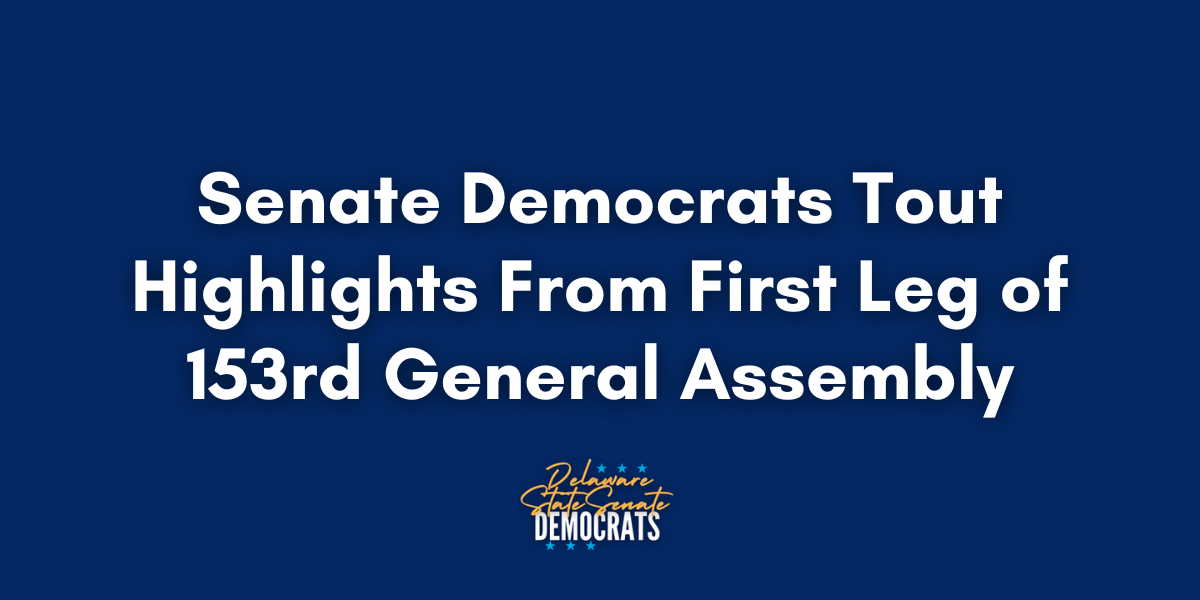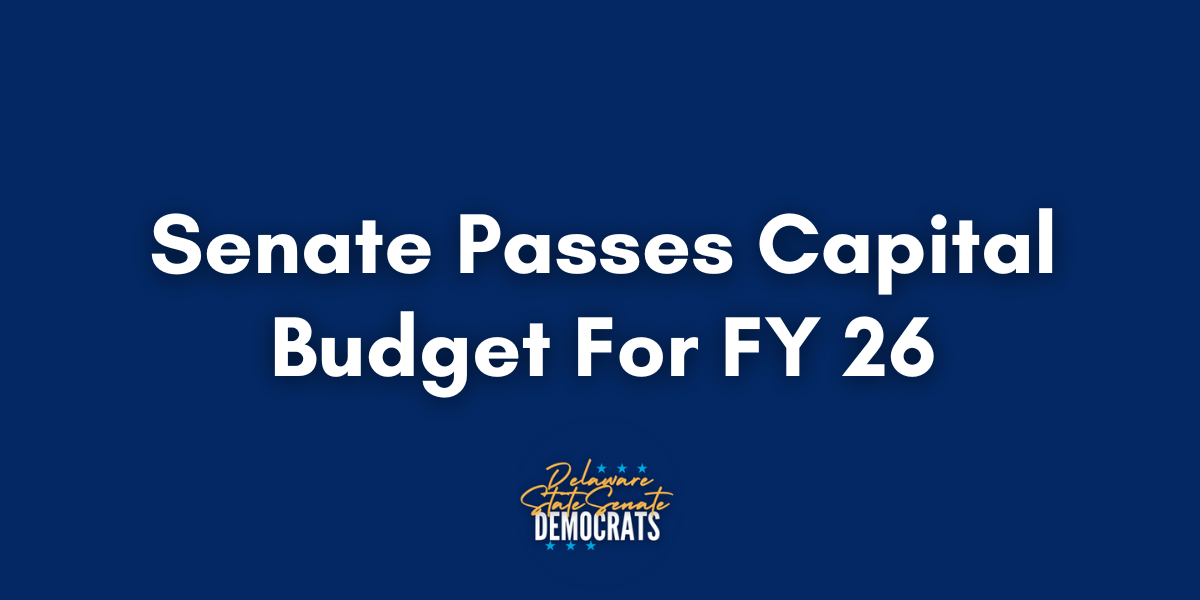DOVER – The State Senate on Thursday sent two more bills to Governor John Carney to assist in the economic recovery of small businesses hardest hit by the COVID-19 pandemic.
Sponsored by and Rep. Ed Osienski and Sen. Jack Walsh, House Bill 285 would provide more than $25 million in tax relief over two years to local companies and state residents who were forced out of work by the ongoing public health crisis.
Specifically, the legislation would exempt unemployment benefits paid in 2021 from Delaware state income tax, maintain the new employer tax rates at 2020 levels, and reduce the unemployment tax assessment rate for merit-rated employers to the lowest of their earned rates for 2020, 2021 and 2022. The General Assembly passed legislation to provide another $25 million in unemployment tax relief last year.
“Thankfully, most – but not all – of the hard-working Delawareans who lost their jobs during the pandemic have returned to work, but the financial burden of those lost wages still remains,” said Sen. Walsh, D-Stanton, the Senate prime sponsor of HB 285. “Exempting the unemployment benefits they received in 2021 will help return some of that money to their pockets, while helping businesses avoid the added tax burden will hopefully make up for some of the revenue they lost during the winter surge.”
A record number of Delawareans have filed for unemployment during the pandemic. The state Division of Unemployment Insurance processed more 185,000 claims each of the past two fiscal years, nearly six times the claims received and processed in 2019. Since March 2020 through December 2021, the Division paid 107,195 people more than $1.5 billion in unemployment insurance benefits, compared to about $67 million in 2019.
Federal pandemic benefits expired in September, reducing the assistance being provided to these families.
“During this pandemic, thousands of hard-working Delawareans lost their jobs through no fault of their own. Although many have returned to work or found new jobs, they are still struggling with the financial difficulties brought on by being unemployed. We owe it to those impacted by the pandemic to take whatever action we can to ease their burden,” said Rep. Osienski, D-Brookside, the lead sponsor of the bill. “Exempting the unemployment benefits that have been a lifeline to so many families will mean that they aren’t blindsided when they file their state taxes this year. We also have numerous businesses that already have faced monumental challenges during the pandemic, so we want to be sure they aren’t penalized with higher taxes or face even more difficulties related to unemployment claims. This bill will protect both residents and businesses as we continue to navigate this ongoing pandemic and its lingering effects.”
Sponsored by Rep. Debra Heffernan and Sen. Spiros Mantzavinos, House Bill 289 would allow liquor stores, farm wineries, brew pubs, microbreweries, craft distilleries and wine auctions to permanently offer curbside service to their customers.
“Just like restaurants, Delaware’s burgeoning craft alcohol businesses have been hit hard by the social distancing restrictions and temporary closures that were necessary to protect the lives of our residents,” said Sen. Mantzavinos, D-Elsmere. “Even after this year’s winter surge passes, many customers may be hesitant to return to their favorite breweries and distilleries, making the recovery harder for those entrepreneurs and the employees who depend on them for their livelihood. This legislation will allow those businesses to bounce back a little faster and help protect the health of their customers going forward.”
To be eligible to offer curbside service, a business must hold a valid off-premises liquor license while the service must be completed by a person certified as a responsible alcoholic beverage server. Sales to intoxicated individuals and anyone under the age of 21 will still be prohibited.
“Since the earliest days of the pandemic, businesses have had to get creative to keep their doors open while protecting their customers’ health,” said lead sponsor Rep. Debra Heffernan, D-Brandywine Hundred South. “This bill gives businesses another tool to meet their customers’ needs and allows residents to support their favorite brewery, distillery, or winery even if they don’t feel comfortable dining out.”
Passage of HB 285 and HB 289 comes one week after the Senate voted to permanently extend key provisions of Delaware’s COVID-19 pandemic response.
House Bill 280, passed by the Senate on Jan. 19, provides discretion to the Secretary of the Department of Health and Social Services in certificating nursing assistants. Sponsored by Rep. David Bentz and Senate President Pro Tempore Dave Sokola, HB 280 was signed into law by Governor Carney on Jan. 24.
“While we have been careful to avoid legislating permanent solutions to temporary problems throughout this ever-changing pandemic, there are lessons we have learned over the last two years that will help lift up our state moving forward,” said Sen. Sokola, D-Newark. “By granting greater discretion to DHSS in how certified nursing assistants are trained, we can quickly send reinforcements to our already overworked medical professionals and better address staffing shortages during public health emergencies in the future.”
Through a revision to his standing State of Emergency declaration, Governor Carney this month reduced the hours of clinical training required for nursing assistant certification to help facilitate the rapid deployment of 70 National Guard members who are assisting with non-clinical operations inside skilled nursing facilities during the winter surge.
Modeled after a Minnesota initiative, HB 280 would leave the hours of classroom and clinical training required for nursing assistant certification permanently at the discretion of the DHSS Secretary as long as nursing assistants hired to work in skilled care, intermediate care or assisted living facilities undergo an orientation period that includes clinical hours.
Sponsored by House Speaker Pete Schwartzkopf and Sen. Ernie Lopez, House Bill 290 would allow bars and restaurants to permanently sell to-go alcoholic beverages and offer extended outdoor table service. The Delaware General Assembly originally authorized those changes on a temporary basis in 2020 and later extended them through March 2022.
HB 290 would specifically permit any restaurant, brewpub, tavern, taproom, or other entity with a valid on-premise liquor license to continue selling alcoholic beverages for take-out, curbside or drive-through service. Restaurants also would be able to utilize previously approved expanded outdoor seating, under certain conditions, without triggering the need for a new license application.
An amendment added by the Senate on Jan. 20 would require customers to purchase a minimum of $10 of food along with their to-go alcoholic beverage. The amended version of the bill was passed by the House on Thursday and now heads to Governor Carney for his signature.
“While the pandemic has been extremely challenging for families and businesses across the state and country, it also has forced us to get creative at times. Restaurants and bars were among the hardest-hit industries these past two years, and we had to use some ingenuity to provide assistance,” said Rep. Schwartzkopf, D-Rehoboth Beach. “The outdoor dining and to-go cocktails options have been extremely popular and have allowed restaurants and bars to serve patrons safely. These innovations are about to expire, but even as this health crisis continues, it’s clear that there is a market and a desire for these practices to continue for good.”
###



